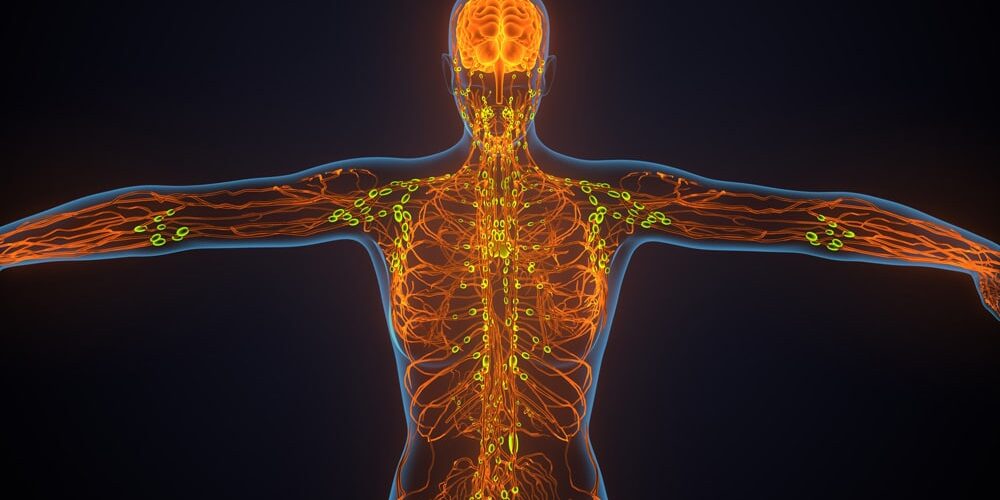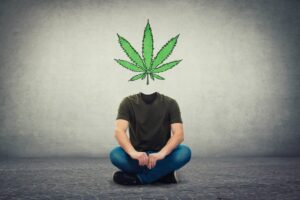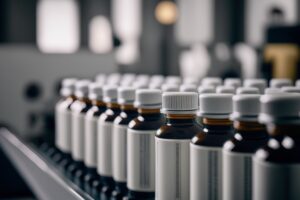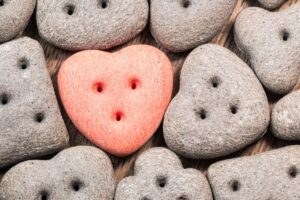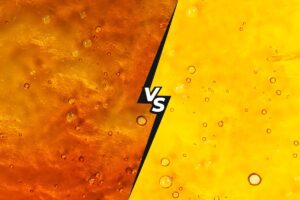The effects of CBD tend to follow a predictable path that determines how long it lasts and stays in your system.
How long do CBD effects last?
Expect CBD effects to last for at least two hours up to a maximum of eight hours per individual dose.
What’s the reason for such a big difference in how long CBD can work?
It’s because the way you consume your CBD changes its bioavailability and affects how long it lasts. CBD bioavailability refers to how much active ingredient your body can soak up from the amount you take. It varies based on whether you take oil tinctures, vapes, topicals, or CBD edibles.
Individual Differences of CBD Products |
||||
|---|---|---|---|---|
| How you take it | Bioavailability | Absorption | Peak Effects | How long it lasts |
| Vaping Inhale |
31% - 56% | Less than a minute | 10 minutes or less | About two hours |
| Oral Swallow |
5% - 19% | Within an hour | One to two hours | Up to eight hours |
| Sublingual Hold 30 seconds under tongue |
13% - 19% | Within an hour | One to two hours | Up to six hours |
| Topical Apply to target areas |
5% | Within an hour | One to two hours | Up to six hours |
| Rectal CBD suppository |
5% | Within an hour | One to two hours | Up to six hours |
Knowing how long various CBD products last in your system can help you turbo-charge your wellness plan with the right product or combination of products.
Let’s review the pros and cons of the five most popular CBD product types based on how quickly they work, how much is absorbed into your body, and how long each helps you feel better.
Vaping CBD cartridges
Inhalation is by far the fastest way to feel CBD benefits. Research shows inhaling CBD vapor is 31-56% bioavailable and delivers peak blood concentration within 10 minutes. These results tell us the human body rapidly soaks up considerable amounts of Cannabidiol after vaping. The tradeoff is the duration of activity is typically an average of just two hours, so you may need to vape CBD more often to maintain positive effects.
Pros: Fast-acting relief that’s easy to use on the go. High bioavailability means you get the most bang for your buck using vaping products.
Cons: Short-acting duration of benefits. Difficult to know how much CBD you take because the concentration in a vapor puff cannot be easily measured. May exacerbate asthma and other respiratory health conditions. Long-term health effects from PG, VG, and MCT carrier compounds used in vape products have not been adequately studied.
Oral and edible CBD
Taking CBD by mouth offers lots of product variety. That might be why it’s the most popular way to take it! Go with organic CBD oils or a softgel capsule form to keep things simple. You could also liven it up with tasty CBD gummies, deliciously sweet honey sticks — even make your own scrumptious baked goodies and snacks using Cannabiva concentrates!
Oral CBD products are 5-19% bioavailable and last the longest compared to other ways people take it. According to research, oral use delivers the most consistent CBD levels in the bloodstream, which leads to reliably long-lasting benefits you can count on.
Pros: Begins working within the hour but may take up to a few hours to reach peak effects. Convenient — and sometimes tasty — dosing makes it easy to take it wherever you go. Oils and softgels offer the most accurate dosing. Oral use lasts up to eight hours when accompanied by a high-fat meal.
Cons: Onset of benefits may not be fast enough for some people. Taking CBD on an empty stomach decreases its absorption rate and bioavailability.
Sublingual CBD use
CBD oil administered under the tongue — called sublingual ingestion — is one of the top ways people use this wonder compound. Taken under the tongue, CBD bypasses the digestive system and absorbs directly through the tiny blood vessels in your mouth. Hold CBD oil under the tongue for at least 30 seconds before swallowing. Sublingual CBD is 13-19% bioavailable in cannabis clinical studies.
Pros: Sublingual doses work in minutes, with peak effects in about an hour. Easy-to-measure graduated dropper makes it a snap to use your Cannabiva oil at home or on the go. CBD health benefits last up to six hours.
Cons: Some people do not like the flavor of CBD oils, which taste like a mix of nutty, grassy, herbal, and medicinal flavors. Flavorless CBD isolate oil may be an alternative for users who don’t want to taste anything when they take CBD.
Topical application
Transdermal patches and topical CBD products in the form of balms, salves, creams, and oils help your body heal from the outside-in. Topicals are advantageous because they deliver focused and targeted relief where you need it most. This method absorbs directly through your skin and bypasses the digestive system. External CBD is about 5% bioavailable, so consider choosing high-potency products to ensure maximum CBD levels in your system. Topical CBD benefits last up to six hours.
Pros: Soothes everything from superficial cuts, scrapes, and burns to minor skin irritation, redness, and inflammation. Apply anywhere you need targeted relief.
Cons: CBD on the skin may take two hours or more to reach peak effects. Some products may feel greasy to the touch. Best for localized benefits and small target areas.
Suppositories and rectal use
Using CBD suppositories provides localized internal benefits similar to topical skin application. More research is needed for this specific form of CBD because bioavailability in rectal use has not been established. Rectal CBD bioavailability is estimated to be 5-19%.
RELATED ARTICLE: Discover CBD suppositories for intimacy and health
People report feeling effects within one hour of using a suppository. Expect benefits to last four to six hours.
Pros: Targets the colon and lower bowels directly. Suppositories are perfect for someone who cannot take cannabis hemp plant products orally or a CBD user with bowel-specific wellness concerns.
Cons: Clinical study for CBD suppositories is limited, so very little is known about its activity in the rectum and colon. Leakage may occur from CBD suppository use.
How long CBD remains detectable in your body
You might not feel the effects of CBD any longer, but that does not mean it’s completely gone from your system. The period CBD remains detectable in your body is called the detection window. It varies based on the drug screening method used:
- Saliva Test
CBD is present in saliva for one to three days - Blood Test
Blood tests can detect CBD for up to 3½ days - Urine Test
CBD is detectable in urine tests within hours and may remain detectable for up to 30 days - Hair Test
Hair tests detect cannabinoids like CBD for up to 90 days
Urinalysis is the most prevalent drug testing method used to detect intoxicating and illegal drugs. CBD drug screening is quite rare because Cannabidiol is non-psychoactive, and it became legal in the United States after the 2018 Farm Bill passed into law. So, there is typically no reason to screen for it.
Will CBD cause a positive drug test result?
Pure CBD alone will not cause a positive result on a standard drug test that screens for intoxicating and illegal substances. A special screening method must be used to detect CBD.
Users taking over-the-counter full spectrum products or broad spectrum products should be aware that they are consuming small amounts of THC. Both product types contain less than the legal federal level of 0.3% THC dry weight and can never get you high or stoned. However, the THC in them may be detectable by drug tests.
Cannabinoids like CBD and THC are lipophilic, meaning they love hanging out in fat cells until they are broken down and removed from our bodies. Chronic users should be aware that even the tiniest amounts of THC may build up in fat cells with daily use. One small cannabis study suggests you have a 50/50 chance of passing a THC drug test after daily full spectrum CBD use over a 4-week period.
It’s best to avoid taking CBD products with detectable THC levels for at least 30 days to be on the safe side if you are concerned about passing a drug screening.
What affects how long CBD stays in your system?
CBD remains detectable for up to 30 days from your last dose — that’s the maximum amount of time CBD stays in your system based on its half-life.
CBD half-life refers to how much Cannabidiol is in your bloodstream at a specific time after taking it. After one half-life has passed, it means that 50% of the CBD has been removed from your body. Half-lives are tricky because our bodies are all unique, and so are the conditions under which many people use CBD.
How long CBD actually stays in your system depends on various factors, including body composition, diet, metabolization, whether you take other medications, how much CBD you take, and how often you use it.
Body composition
People with more fat mass vs muscle mass tend to metabolize CBD more slowly. CBD is lipophilic, meaning it’s easily stored in fat cells. As a result, it’s likely to remain detectable much longer if you are overweight.
Diet and Metabolism
Diet and individual metabolism are crucial in how long CBD remains in your body. One clinical trial designed to study the influence of food intake on CBD effects found that participants could extend the duration of benefits up to eight hours by taking it with a high-fat meal. CBD taken on an empty stomach has much lower bioavailability and does not last as long.
Pre-Existing Medical Conditions
Health conditions affecting liver function may slow down CBD metabolization, leading it to last longer and build up to higher levels in your bloodstream. Individuals diagnosed with liver disease or liver damage should get medical guidance before taking CBD. The nature and severity of your condition could affect how much CBD you may safely take at one time.
Medications
CBD is broken down in the liver using the same enzyme system as many prescription medications. This means taking CBD together with certain drugs may affect how they work because they are competing for the same enzymes, potentially leading to altered levels of the substances in your bloodstream. Talk to your doctor about adding CBD to the mix if you take other prescription medications.
How much you take
The CBD dosage you take every day affects how long it lasts and stays in your system. Daily use is recommended to build up adequate levels in the bloodstream. How much CBD you need per day depends on your weight. Review the Cannabiva CBD dosing chart to find the right amount for you.
How often you take it
Dosage frequency — how often you take CBD — will vary based on your unique wellness concerns and personal needs. Once daily use is suggested to establish positive cannabinoid levels in the blood. Safely use CBD every four to six hours or as your practitioner recommends.
Wrapping Up: How Long Does CBD Stay in Your System?
You’ll feel the benefits of CBD for up to eight hours, and it stays in your system an average of three to five days. CBD remains detectable for up to 30 days from the last time you used it. But testing for it is usually rare because it is non-psychoactive and legal in the United States, according to farm bill regulations.
Everybody is unique, so the amount of time CBD lasts and stays in your system varies based on several factors, including your diet, dose, and the CBD product type you take.
How long does CBD stay in your system FAQ
Check out our FAQ below or live chat with a Cannabiva Wellness Advisor if you have a question we haven’t answered for you today.




